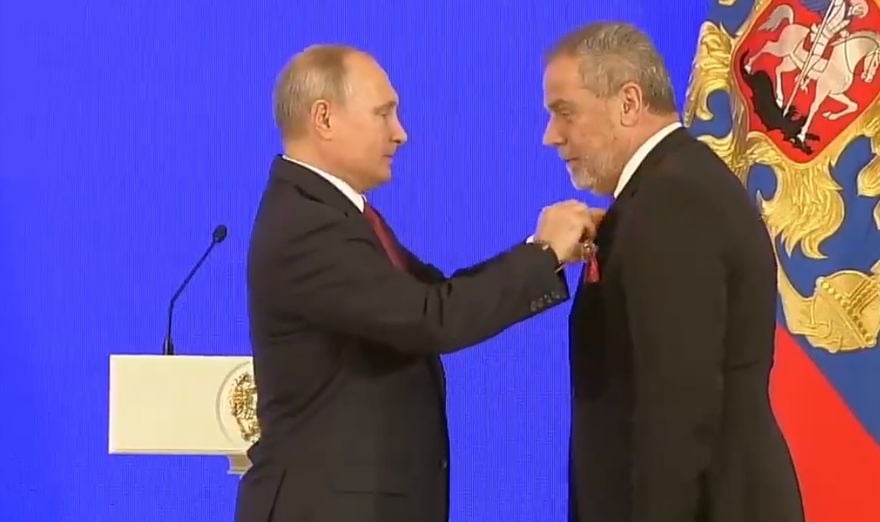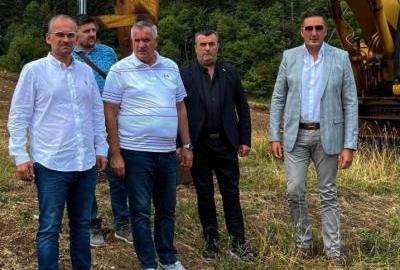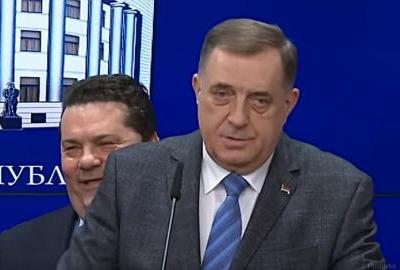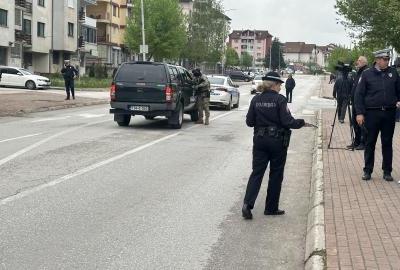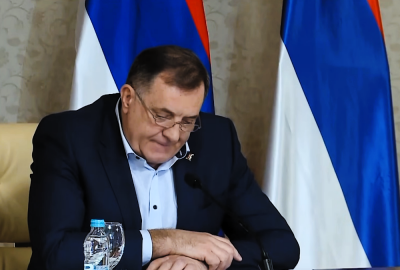Istražujemo
Control of the electoral and judicial system: Russian influence on security and intelligence services in BiH
During his visit to Russia Čović gave an interview to Rossiyskaya Gazeta daily where he said: “Unfortunately, there is very little Russian influence in BiH.” We are publishing the dossier of Russian intelligence organizations’ activities in BiH

The pre-election campaign had not even officially started in the month of May 2018, but the leader of HDZ BiH, DraganČović, was already leading a battle for the new term in the BiH Presidency.
“The Croat member of the Presidency of Bosnia and Herzegovina, Dr Dragan Čović, was elected ordinary member at the regular convention of one of the most renowned European institutions in the field of technical sciences, the International Academy of Engineering. That prestigious Academy currently has 1300 members from 40 countries, including the heads of governments, and presidents of foreign countries, prominent scientists. The successful work of the Academy members has gained enormous international recognition and therefore the Academy is one of the leading academies in the world”, stated the private office of the Croat member of the BiH Presidency, Dragan Čović, on May 21, 2018.
No other details about this Academy were given in the press release of the Presidency. But, two sentences were enough for a search that led us to a web page with the Russian domain /info-iae.ru/.It is actually the official web page of the International Academy of Engineering whose ordinary member Dragan Čović became.
“The engineering academies of the CIS/countries members of the former Soviet Union/ were established at the end of February on the basis of the Engineering Academy of the USSR. These academies became the official founders of the International Academy of Engineering. The Ministry of Justice registered the Academy as an international public organization. Boris Vladimirovich Gusev has been the president of the Academy since its establishment”, reads the web page of the Academy.

HONORARY VICE PRESIDENT ČOVIĆ
Boris Vladimirovich Gusev, as his official biography reads, has received several national awards of the Russian Federation for his work. The web page of the Academy of Engineering Sciences of Serbia reads that Gusev actively participated in the pre-election campaigns of the Russian President Vladimir Putin.
Dragan Čović and Boris Vladimirovich Gusev officially met in October of 2013. “Večernji list” daily had then published a report from the ceremony held at the University in Zadar.

“The founding of the Central European Division of the International Academy of Engineering, headquartered in Vienna, was held yesterday in the ceremonial hall of the University of Zadar. In the presence of representatives of the international academic and scientific community, the President of the International Technical Academy prof. Boris Vladimirovich Gusev and the president of the Central European Division Branko Katalinić received the first 13 members from different parts of the world who were awarded diplomas and medals. The president of HDZ BiH, prof. dr. Dragan Čović,is amongst the new members”, read the text published on October 25, 2013.

Five years later, Dragan Čović becomes the honorary vice president of the Russian Academy of Engineering Sciences.
“He was accepted on no grounds whatsoever. He did not meet any requirements. It is pure politics at its finest”,said for Žurnal one of the Academy members, a university professor of mechanical engineering, who conditioned his interview with anonymity.

According to Scopusu,the largest abstract and citation database of peer-reviewed literature, Dragan Čović was never cited as a scientist. However, it was no obstacle to having a ceremony held in Vienna on September 26, 2018, only ten days before the General Elections, to mark the promotion of the HDZ BiH leader to “ordinary member” of the International Academy of Engineering, headquartered in Moscow. The ceremony was organized by the Austrian professor Brandl, years-long associate of Boris Vladimirovich Gusev, associate member of the Russian Academy of Arts and Sciences and the president of the International Academy of Engineering.
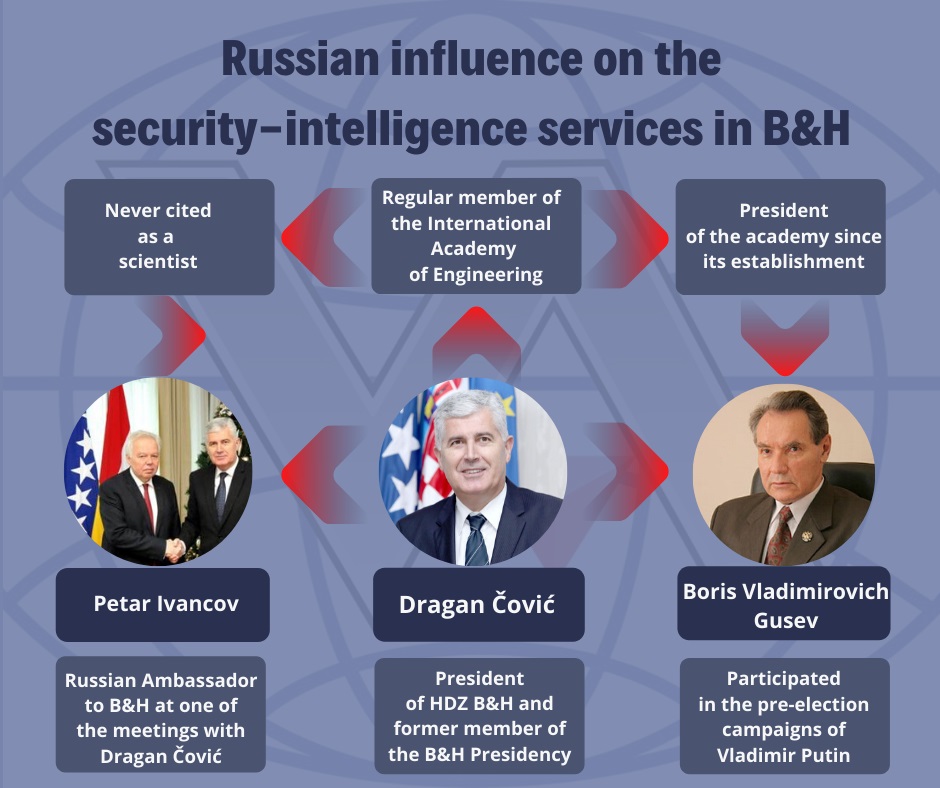
Everything was thus happening in the midst of the pre-election campaign during which Dragan Čavić was fighting for a new term in the BiH Presidency. He did not get it. The president of Democratic Front, Željko Komišić, became the Croat member of the BiH Presidency on October 7. Admitting the defeat Čović accused Bosniak voters of electing Komšić.
“Bosniaks cannot elect legitimate representatives to Croats. It is a path of retrogression; it is not a European path. It is a message to the representatives of international institutions”, said Čović.
APPEAL BEFORE THE CONSTITUTIONAL COURT
Two weeks later, before handing over the duties to Komšić, Čović met with the Russian Ambassador to BiH, Petr Ivancov, in Mostar.
“On this occasion the Croat member of the Presidency of Bosnia and Herzegovina, Dragan Čović informed Ambassador of the Russian Federation about the plebiscite support which the Croatian National Assembly achieved among the Croats of Bosnia and Herzegovina. The interlocutors agreed it is necessary to continue the support to the preservation of the principle of constituency of all three peoples in Bosnia and Herzegovina, as the foundation of the Dayton Peace Agreement and a sovereign Bosnia and Herzegovina”, read the statement of October 24, 2018.
It was just one of many Čović’s meetings with the Russian Ambassador to BiH. In 2016 Dragan Čović, who was then the Croat member of the Presidency, met with Petr Invancov two times. They met in April 2016 on Jahorina, where they discussed possibilities of “Russian Federation’s investments in BiH”. Three months later, on July 26, 2016, Čović met Ambassador of the Russian Federation again.
“Croat member of the BiH Presidency, Dragan Čović and Russian Ambassador to BiH, Petr Ivancov, expressed the intention to intensify the engagement aimed at further improvement of bilateral relations in all areas, particularly in area of economic cooperation”, stated Čović’s personal office in July of 2016.
In the same year when Čović starts intensive association with the Russian diplomats, his first associate Borjana Krišto files an appeal with the BiH Constitutional Court seeking repeal of certain provisions of the Law on Intelligence-Security Agency of BiH. The appeal was filed on December 7, 2016 and the constitutional judges from the ranks of Bosniak people, Mirsad Ćeman and Seada Palavrić, could not decide on the appeal as they participated in enactment of the said Law. The session of the Constitutional Court was then chaired by Mato Tadić, judge from the ranks of Croat people who was together with Dragan Čović accused of high –level corruption in the court case Lijanović and others. The Constitutional Court of BiH passed the decision on June 1, 2017.
“The appeal of Borjana Krišto, second deputy speaker of the House of Representatives at the time appeal was filed, is upheld. It is determined that provisions of Article 78, paragraphs 3, 4, 5 of the Law on Intelligence-Security Agency of BiH are not in line with the Constitution of BiH”, read the decision published on June 16, 2017.

Disputed provisions enabled the Intelligence and Security Agency of BiH to technically surveil telecommunication for 60 days plus 30 additional days when “in justified cases, the judge may extend the warrant”, as well as that “the use of these measures may be authorized by the Director-General with the agreement of the Chair of the BiH Council of Ministers when delay would cause irreparable harm to the security of Bosnia and Herzegovina”, but that the “Director-General must immediately inform the judge thereof”.
The decision ordered the Parliamentary Assembly of BiH to amend these provisions within 6 months i.e. by the end of 2017. In the meantime Borjana Krišto becomes Speaker of the House of Representatives of the BiH Parliament, and before the expiry of the deadline to amend the provisions of the Law on Intelligence and Security Agency she meets with the Russian Ambassador Petr Ivancov, who presents her with the “invitation letter of the President of the State Duma of the Federal Assembly of the Russian Federation Vyacheslav Volodin to participate at a conference in Moscow.”
Meanwhile, the party boss of Borjana Krišto, Dragan Čović, holds regular meetings with the Russian Ambassador. In February 2017 Čović and Ivancov agreed that “it is necessary to build an ambiance of quality of the constituent peoples”. A new meeting happened again on July 7, 2017.
“Čović positively valued continuity of responsible and constructive communication of the representatives of Russian Federation in the Peace Implementation Council”, reported the Republika Srpska Radio and Television on July 7, 2017.
At that time, but even later, the representative of the Russian Federation in the Peace Implementation Council had been giving dissenting opinions in regard to other PIC members. The Russian Ambassador Ivancov mostly supported secessionist moves of the Republika Srpska leader, Milorad Dodik, whose key partner at that moment was Dragan Čović. Following the meeting on July 7, 2017, Čović publicly commended views and actions of the Russian Federation in BiH.
“It is a joint assessment that it is important to continue fostering good relations in the interest of both countries, but also to avoid disastrous effects of global polarization process,which is unacceptable in BiH as it may increase the threat to peace, stability and economic prosperity”, read Čović’s press release after the meeting with Ivancov.
ECONOMIC PROSPERITY FROM KONOBA
At that very time Čović’s representatives were negotiating “economic prosperity”, and the first important meeting was held in February 2017 at Konoba restaurant in Zagreb. The intelligence agencies documented that a meeting was held then, and attended by Josip Jurčević, director of company Luka Ploče Energija d.o.o. Ploče, Ivan Vukadin, mayor of Tomislavgrad Municipality, Branko Bago, mayor of Posušje Municipality and an unknown person of Russian descent. According to the information of the Intelligence-Security Agency of BiH, the topic of the meeting was privatization of the Posušje bauxite mine, which was to be bought by Russian investors using Sberbank funds. The Russian takeover of Mostar Aluminij was also discussed.
Josip Jurčević is actually the former director of the Croatian Security Agency, known as SOA and is a close associate of former highly ranked SOA official and then deputy of the Croatian HDZ president Milijan Vaso Brkić, whose name is important to the rest of the story. Jurčević came to the meeting in Konoba as the representative of the company "Prvo plinarsko društvo" (PPD), which will later become the main partner of the Russian company GAZPROM.
The takeover of Mostar Aluminij was discussed in February together with Čović’s cadre from HDZ BiH. Four months later, namely on June 28, 2017, a meeting was held at the BiH Foreign Trade Chamber and was attended by deputy Russian Ambassador to BiH Petr Frolov and Croatian Ambassador to BiH Ivan Del Vechio. The interlocutors discussed investments in Mostar Aluminij, and the official website aluminij.ba published that the interlocutors discussed elimination of customs duties on unalloyed aluminum, which would lead to “doubling of existing foreign trade exchange with Russia”. It was also agreed that “the Russian Ambassador Petr Ivancov will inform the official Moscow about that line of argumentation.”
Shortly afterwards, Aluminij sent to the FBiH Government a letter requesting elimination of customs duties on unalloyed aluminum, which was done at the end of that year.

Parallel to that, the Russian Sberbank signed a bank guarantee for Aluminij to buy electricity from Elektroprivreda BiH before that Mostar Company starts buying electricity from the company Erdald.o.o. Sarajevo, which was established by the company from Croatia, Prvo plinarsko društvo i.e. Energija naturalis in which one of the directors was the former deputy director of SOA, Josip Jurčević.

Everything thus matched the information of the Intelligence-Security Agency of BiH received after the February meeting in Zagreb restaurant Konoba. The response followed after the story become public.
“Exclusive document”, read the headline of Zagreb Nacional weekly of September 19, 2019 “spies from BiH wiretapping, following and secretly surveilling Croatian politicians and businessmen”.
A document of the Intelligence-Security of BiH that provides information of Russian intentions to take over Mostar Aluminij was published in the text. It was never discovered how a document of BiH intelligence agency ended up in Zagreb. The chief inspector Damir Bevanda, who is cadre of Croatian Democratic Union of Dragan Čović, should have conducted internal investigation on leak of documents from OSA. So, to shortly repeat – in the period when the Russian investors were arranging takeover of Aluminij through HDZ BiH cadre and the former Croatian intelligence officers,the Croatian media published the story that Intelligence-Security Agency of BiH is wiretapping politicians and businessmen in Croatia.
CERTAIN ELECTION OF ČOVIĆ
At the same time, based on the appeal of HDZ’s MP in BiH, Borjana Krišto, the BiH Constitutional Court ruled the provisions of the Law on Intelligence-Security Agency of BiH, which actually regulated wiretapping, unconstitutional. HDZ BiH leader Dragan Čović was at the same period intensively meeting the Russian Ambassador to BiH Petr Ivancov. The last meeting that we mentioned was the one held on July 7, 2017 when Čović actually stated that BiH must avoid global polarization. Only five days after the meeting with Ivancov, Čović met with Milorad Dodik in Mostar, who was at that time the president of Republika Srpska and who doesn’t hide that he represents geopolitical views of the Russian Federation.
“The Intelligence-Security Agency is a hostile organization”, said Dodik on July 12 in Mostar, while Čović added that it “does not work consistently and creates some parasystems.”
At the same time Dodik commended all Croat representatives at the state level, including the ones in security sector, promising continuation of cooperation with HDZ BiH. Not too long after Mostar meeting Petr Ivancov spoke for the BiH edition of Večernji list daily. He mostly supported the views of SNSD and HDZ BiH, and in line with the earlier statements by HDZ BiH leader said how there is an unsolved Croat issue in the Federation and that it has to be addressed.
“Changes to the Election Law are necessary”, read the headline of press release issued on March 7, 2018 after the new meeting Čović-Ivancov.
HDZ proposals of amendments to the Election Law were designed so as to enable certain election of Dragan Čović to the BiH Presidency. This would be the way to address “Croat issue” that the Russian Ambassador Petr Ivancov mentioned in his interview. However, the BiH Election Law was not amended before the BiH Central Election Commission announced the 2018 General Elections. Čović had to change the plan.
It is month of May 2018, the intelligence agencies received the information that the former head of Russian FSB held a meeting in a hotel near Trogir with the HDZ BiH president Dragan Čović, Milijan Vaso Brkić, deputy president of HDZ Croatia and former highly-ranked SOA officer and Milan Bandić, mayor of Zagreb.
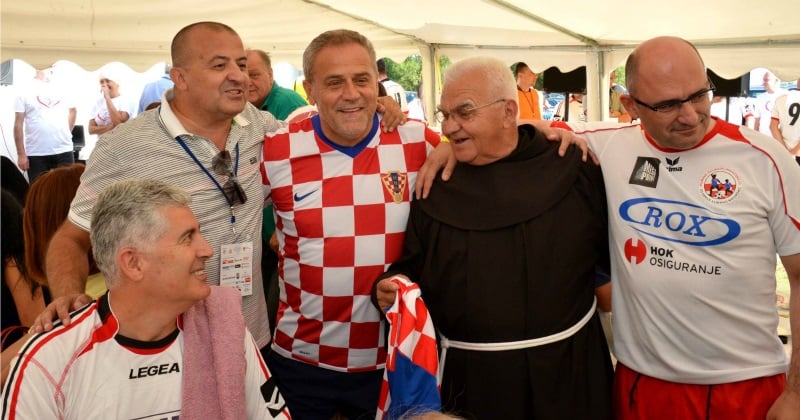
Dragan Čović (bottom left), Milan Bandić (in the middle) and Milijan Brkić (right)
The arrangements were made at the meeting on how to help Dragan Čović to again become Croat member of the BiH Presidency, where he should be “joined”, on behalf of Serb people, by Milorad Dodik. After that meeting Milijan Brkić had on behalf of HDZ Croatia signed an“instruction on field work for preparation and conduct of election campaign for the forthcoming elections in BiH”. The instruction precisely assigns tasks to Croatian officials on the method of registering HDZ voters who were registered to vote abroad. Voters from BiH were massively registered at the addresses in Croatia, receiving voting materials sent by the Central Election Commission.

These votes were checked later. On several occasions Žurnal documented that these were mostly fictitious voters who actually never had resided at these addresses in Croatia. According to the official list of the BiH Central Election Commission there were 24 thousand registered voters for the 2018 General Elections on the territory of Croatia.
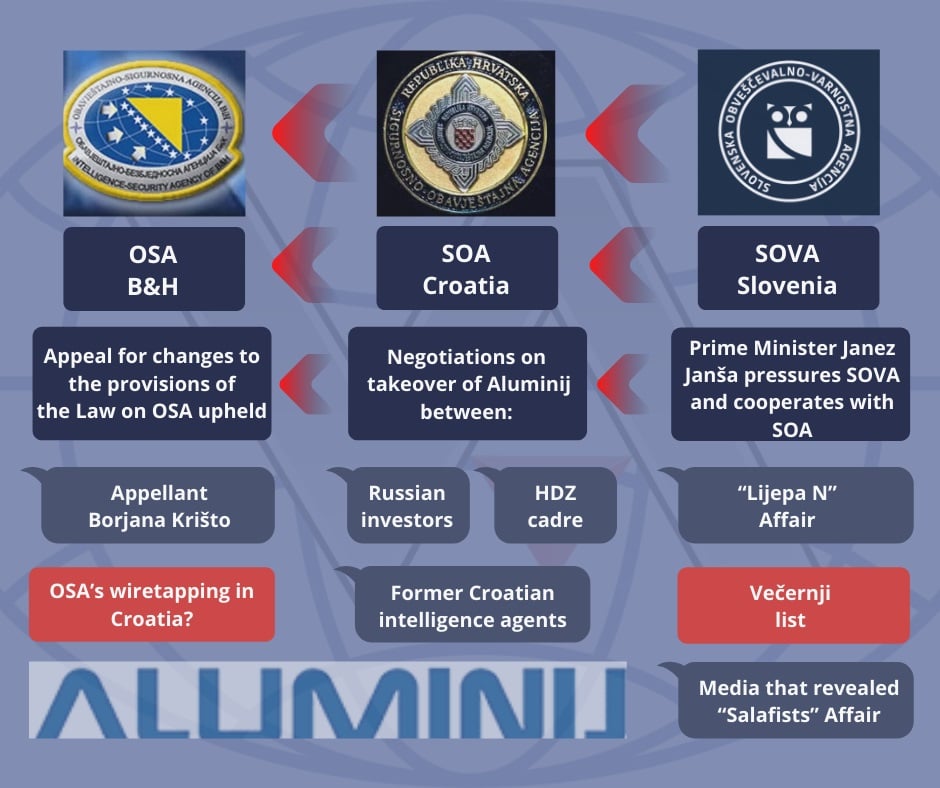
The same thing is happening with the voter registration in Serbia, and shortly before the elections that country sends its intelligence officers close to the Russian Federation to the diplomatic mission in BiH.
BIA AT THE EMBASSY
In September 2018, a month before the General Elections in BiH, Goran Živaljević, former deputy director of the Serbian Intelligence Service BIA, starts working in the Embassy of Serbia in Sarajevo. The public knows Živaljević as the diplomat who on April 27, 2017 partially coordinated action at the Macedonian Parliament, when the pro-Russian politicians caused physical incidents and together with masked persons attacked Zoran Zaev, leader of the pro-Western Social Democratic Union of Macedonia.
“Živaljević met with the criminals from Skopje before the incident in the Assembly. He also met with the journalists whom he tried to influence”, said to Žurnal a Macedonian journalist who did not want his identity to be revealed due to security reasons.
According to the information Žurnal has, Goran Živaljević maintained contacts with the Russian intelligence officers in Macedonia. He, as we already said, came to BiH in September 2018. Yevgeny Zahar Prilepin, a Russian writer known for his paramilitary activities in Ukraine, tried to enter BiH a month before Živaljević. But, Prilepin was denied entry to BiH by the decision of the Intelligence-Security Agency of BiH, and he was turned back from the border. This did not go by without a reaction from the Embassy of the Russian Federation in BiH.
“The Embassy expresses concern and deep disappointment for this incident”, read the press release of the Embassy of Russian Federation.
Discontentment from SNSD followed, but ultimately it did not change the decision for Prilepin, who should have provided support to Milorad Dodik during the pre-election campaign. Anyway, the elections were held in October 2018 and the Russian action was partially successful. Milorad Dodik became member of the BiH Presidency, but Dragan Čović did not. Russian Ambassador, Petr Ivancov, comforted him fifteen days after the elections and before inauguration ceremony for the new members of the Presidency.
“Croat member of the Presidency, Dragan Čović and Ambassador of the Russian Federation in BiH, Petr Ivanvoc, agreed during the meeting in Mostar that it is necessary to continue the support to the preservation of the principle of constituency of all three peoples in Bosnia and Herzegovina, as the foundation of the Dayton Peace Agreement and a sovereign Bosnia and Herzegovina”, stated Čović’s personal office on October 4,2018.
ORBAN AS AN INSPIRATION
After formally handing over the duties at the BiH Presidency, Dragan Čović travelled to Budapest in December 2018 where he met Victor Orban, the Hungarian Prime Minister who does not hide his good ties with the Russian Federation. Čović informed Orban about election in BiH.
“Despite plebiscite support that the Croatian National Congress and HDZ gained amongst Croats in BiH, the Croats were yet again deprived of the position of the BiH Presidency member due to unconstitutional and undemocratic Election Law. This unnecessarily pressures political relations in BiH, and the necessity of changes to the Election Law and the Constitution in order to finally stabilize BiH”, said Čović to the Hungarian Prime Minister.
Dragan Čović and Viktor Orban
“Vladimir Putin is a source of my inspiration” is one of the most famous statements of the Hungarian Prime Minister Victor Orban.
And Victor Orban is a source of inspiration to the leaders of Western Balkans”. That is, at least, what Alijaksej Kazarski, researcher from Comenius University in Bratislava. The leaders of countries of former Yugoslavia indeed love Orban. One of them is the current Slovenian Prime Minister Janez Janša, leader of the right-wing Slovenian party SDS.

In 2017 Orban attended the congress of Janša’s Slovenian Democratic Party, and the two of them do not hide close ties.But, why is it important for this story?
Dijana Đuđić is a BiH citizen from Prijedor. Media in Slovenia had at the end of 2018 published that she “borrowed” 450 thousand Euros to Janša’s SDS for the pre-election campaign. The money was returned after the affair become public, and the key role in that was played by the convicted Slovenian money launder Rok Snežič, who had shared the prison cell with Janez Janša.
Janez Janša
After his release Snežič spent most of his life in Banja Luka, where he had, according to the documents of security services that are in Žurnal’s possession, done business with persons close to SNSD of Milorad Dodik. It was inter alia documented that Snežič had crossed the border with Serbia several times, and once he was in the car with Dijana Đuđić, donor of Janša’s party.
MONEY LAUNDERING
At the request of Slovenian investigative bodies, the State Investigation and Protection Agency of BiH –SIPA investigated the business operations of Dijana Đuđić and a report on committed crime of money laundering and tax evasion was filed against her in May 2019. Žurnal managed to get the most important details of this report.
The investigation discovered that Dijana Đuđić had laundered at least 14 million Euros through her accounts. The money was paid to her from the accounts in Hungary, Austria and Slovakia. A total of 9.4 million Euros was paid to her through the company Romis Slovakia. The company Varteck Szolgaltato paid from its account 2.8 million Euros. The money was further wired to Slovenia, and it was, as suspected by the police agencies,most probably at the disposal of Janša’s friend Rok Snežič. Journalist of Žurnal asked Rok Snežič for an interview, but in return he asked for money, saying at the end that no one can touch him in Republika Srpska. Despite of being related to money laundering and illegal activities, Snežič was never deported from BiH. Also, the BiH Prosecutor’s Office had never brought charges against Dijana Đuđić and her associates - Jelena Sladojević and Tanja Subotić-Došen. The investigation of the donation worth 450 thousand Euros to the party of Janez Janša also never resulted in charges being brought by the BiH Prosecutor’s Office that is managed by BiH and Croatian citizen Gordana Tadić who has family ties with the Vice president of HDZ BiH - Mijo Krešić, who was one of the actors of SOA affair.
RECRUITING OF SALAFISTS
Namely, BiH security agencies had in mid-2019 the information that the officers of Croatian SOA were recruiting members of Salafi movement in BiH to work for their intelligence service, and one was asked to transport explosive and weapons close to a masjid in Zenica. Contacts with salafist from BiH Harum Čelenko, who was asked to transport weapons to Zenica, were confirmed by the SOA Director Daniel Markić himself.
“We talked to H.Č. We know who he is”,said Markić after the affair become public.

However, the BiH Prosecutor’s Office expressly dismissed all the allegations, and passed the order on non-conducting the investigation. The Slovenia media got involved in the entire story, and priest Ivan Tolj, owner of Večernji list and close friend of SOA Director Danilo Markić and vice president of HDZ Croatia Milijan Vaso Brkić, tried to stop the story that was prepared by POP TV journalists.
“The government is asking if that can be solved. It will pay off to you”, said priest Tolj in a phone conversation with one of the directors of a multinational media company.
In a phone conversation that the Slovenia POP TV released in the spring of 2019 Tolj states that the stories about engagement of SOA came from BiH through Žurnal portal. Croatian officials and a portion of Slovenian opposition gathered around Janša started to tell to the media that the phone conversation with the priest was recorded by the Slovenian intelligence service SOVA. Thereafter the media close to Janez Janša publish the affair “Lijepa N” during which the media close to the right-wing SDS accuse the Slovenian Prime Minister for abuse of the intelligence service SOVA. Then in pay comes the parliamentary Commission for supervision of public services of Slovenia that was chaired by Janša’s friend and political ally Matej Tonin.
The so-called KNOVS starts control in SOVA and concludes that the Slovenian intelligence service had acted illegally during the arbitration between Croatia and Slovenia on the gulf of Piran. Although the report is a secret, it was on November 22, 2019 published by the Zagreb edition of Večernji list that is owned by Ivan Tolj, who is close to HDZ of Croatia and BiH.

Before the report was published in Večernji list, Tonin was, as the representative of New Slovenia, visiting Croatia for the Congress of People’s Parties that the high-ranking HDZ officials had also attended. It were the Slovenian media actually that saw a conspiracy in Tonin’s visit to Zagreb, stating that there is certain probability that he gave the report on SOVA operations to Večernji list.
“SOVA accused Tonin for revealing Slovenian deception in arbitration”, answered Večernji list on November 26,2019 saying that the Slovenian service wants to remove Janez Janša.
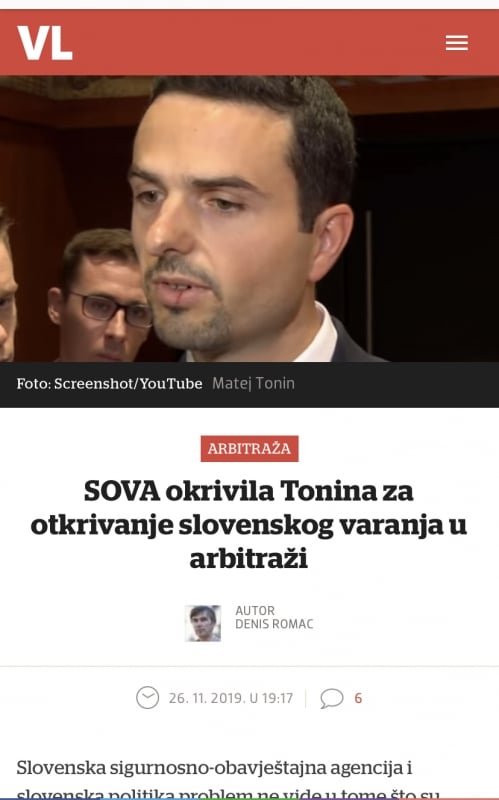
The priest’s Večernji list was actually the main media that worked on discrediting the key witness in the SOA case,i.e. the BiH salafist Harun Čelenko who witnessed that the Croatian intelligence officers had asked him to move explosive to a masjid in BiH.
“The key witness for accusations from BiH – a radical Islamist from Zenica”, published Večernji list on April 27,2019.
TERMINATION OF INVESTIGATION
As we already said the BiH Prosecutor’s Office did not want to investigate this case. The head of the Prosecutor’s Office is Gordana Tadić who met with Petr Ivancov shortly before the SOA affair appeared. After the SOA affair became public the Ambassador of the Russian Federation in BiH was providing support to the work of judiciary, and the key support was also provided to the president of HJPC Milan Tegeltija after the affair “Potkivanje” (Shoeing) that Žurnal published and whose main actor was the head of the BiH judiciary. It was also the reason for demands made to remove him from the position.
“I have seen the footage. I am neither an investigator nor a judge. As far as I know Tegeltija provided an explanation of the footage and it was accepted by the Disciplinary commission. I have certain doubts concerning source of the footage. I am familiar with Žurnal’s sources. As far as I am concerned, portal Žurnal is not credible. Simply, there were several situations where Mr. Avidić, journalist of Žurnal, got caught up in internal political procedures and processes. Do you remember the affair with the Croatian intelligence agency? He somehow managed to mix everything up and to say that this case happened a few weeks after the Russian Ambassador met with Gordana Tadić and that we had planned it. It is nonsense. How can I now trust that portal?” said the Russian Ambassador Petr Ivancov during an appearance at N1 television on June 10, 2019.
Three days earlier the Embassy of the Russian Federation in BiH gave a press release expressing “unpleasant surprise with the OHR’s statement concerning the attempts to undermine the reputation of the judicial bodies in BiH, i.e. the HJPC and its President. To briefly recall, the OHR criticized the work of judiciary after emergence of the affair “Potkivanje” in which Milan Tegeltija is arranging settling of some criminal cases in a café, after which the mediator collects money from the injured party.
“Instead of supporting independence of these institutions, the OHR decided to exert pressure on the bodies of sovereign BiH by arrogantly interfering with their work and imposing its own vision of how to address the issue. We urge the judicial bodies in BiH to do their work prescribed by the Constitution in a responsible, professional and independent way, without any fear and external interference”, read the press release of the Russian Embassy published on June 7, 2019.
Apart from the Embassy of the Russian Federation, the support to the HJPC and the judiciary came from the officials of Dodik’s SNSD and Čović’s HDZ BiH. In return not a single case relating to the crime associated with the officials of these two political parties was prosecuted since Gordana Tadić assumed her office. Case- illegal registration of voters in Croatia i.e. electoral fraud.
“We had two cases, one is closed”, said Gordana Tadić to the journalists of Žurnal.
When asked how the case related to the elections was closed, Tadić said: by termination of investigation.
UNFORTUNATELY, VERY LITTLE INFLUENCE
Electoral frauds, namely fictitious voter registrations, will not be prosecuted. As we previously said the officials of the two HDZs Dragan Čović and Milijan Vaso Brkić were behind that process. They were at the meeting in Trogir together with Milan Bandić where they received instructions from the Russian intelligence officer Nikolaj Patrušev.
Although the Croatian SOA is denying all allegations, the events that followed after the 2018 May meeting in Trogir speak volumes.
In November of the same year Milan Bandić was presented a medal- guardian of relations with Russia by Vladimir Putin in Kremlin. Brother of Milijan Brkić, Jozo Brkić, was invited to business forums in Russia as a guest.
Vladimir Putin presents a medal to Milan Bandić
Dragan Čović was guest of Valentina Matviyenko, chairwoman of the Federation Council of the Federal Assembly of the Russian Federation, in February of this year. Thereafter he was the guest at the State Moscow Institute for International Studies as the academician of the International Academy of Engineering from Moscow, whose member he became without a single relevant scientific paper.

During his visit to Russia Čović gave an interview to Rossiyskaya Gazeta daily where he said: “Unfortunately, there is very little Russian influence in BiH.”
(zurnal.info)




